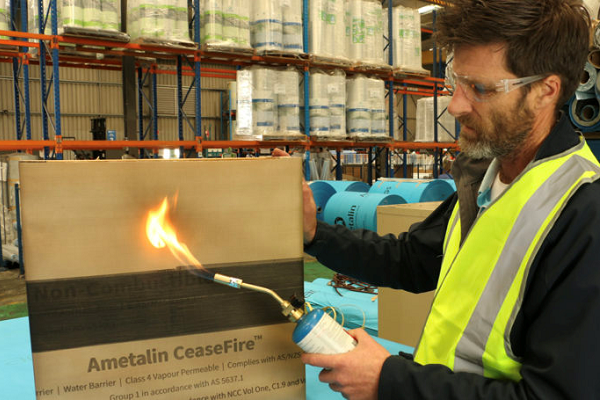Fire-proof building wrap sparks growth for Australian firm

The launch of a fire-proof and waterproof building wrap designed for high-rise buildings and homes in bushfire zones is set to drive growth for South Australian manufacturer, Ametalin.
After launching its CeaseFire barrier in June 2020, Ametalin claims it’s the only product of its kind in the world that is both waterproof and fireproof while still allowing vapour to pass through. The new CeaseFire product is made from fiberglass weave material impregnated with fireproof polymer.
The company’s technical team was inspired to develop the product following the devastating Grenfell Towers apartment fire in London in 2017 and a series of bad bushfire seasons in Australia.
Ametalin chief executive Stephen McIntyre says the company had already been inundated with inquiries from around Australia and as far afield as Japan, Vietnam, Myanmar and India since launching CeaseFire.
“Material of this type that can withstand really high heat stress is used in some other high-end applications but what we’ve cracked the code on is how to make it and apply it into buildings,” he says.
“We think we have stimulated a discussion in the market place in Australia about the level of performance of fire-proof systems for buildings and by us providing this product it’s a real step-up in that area to improve options and performance in buildings.”
Ametalin employs around 60 Australian staff with some manufacturing in Australia and most of the manufacturing done in its Malaysian plant. However, Stephen says it is looking for options to produce CeaseFire in Australia.
“We think over time this will be our flagship high-end product that’s used for buildings in high-risk zones or in multi-storey buildings where you need to make sure you can stop a fire moving from zone to zone,” he says.
“It’s an exciting time for us because it’s a product that will do a lot of good and we’re really hopeful it will give us an opportunity to grow the jobs here, which in a manufacturing environment is often difficult.
“But at the moment we are seeing the demand and if there is a sensible way for us to work through that then we would very much like to do it.”
